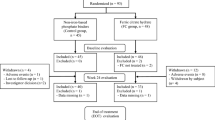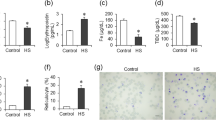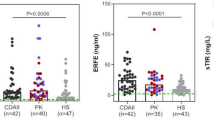Abstract
WHEN the red-cell hæm of familial hæmolytic anæmia patients is isotopically tagged, as by the administration of glycine-15N, the curves of subsequent isotope-levels may be interpreted in more than one way. Two very different interpretations are given here as subcases of a single model, and their relation to actual cases is discussed.
This is a preview of subscription content, access via your institution
Access options
Subscribe to this journal
Receive 51 print issues and online access
$199.00 per year
only $3.90 per issue
Buy this article
- Purchase on Springer Link
- Instant access to full article PDF
Prices may be subject to local taxes which are calculated during checkout
Similar content being viewed by others
References
Hagen, Paul S., Bull. Univ. Minn. Hosp., 23, 552 (1952).
London, I. M., Shemin, D., West, R., and Rittenberg, D., J. Biol. Chem., 179, 463 (1949).
James, III, G. Watson, and Abbott, jun., Lynn D., Proc. Soc. Exp. Biol. Med., 88, 398 (1955).
Wintrobe, M. M., “Clinical Hematology”, 39 and 59 (Lea and Febiger, Phila., 3rd. edit, 1951).
Evans, Robert L., Nature, 173, 129 (1954).
Author information
Authors and Affiliations
Rights and permissions
About this article
Cite this article
EVANS, R. Red-Cell Survival in Familial Hæmolytic Anæmias. Nature 177, 839–840 (1956). https://doi.org/10.1038/177839a0
Issue Date:
DOI: https://doi.org/10.1038/177839a0
This article is cited by
-
Red-Cell Survival in Familial Hæmolytic Anæmias
Nature (1957)
Comments
By submitting a comment you agree to abide by our Terms and Community Guidelines. If you find something abusive or that does not comply with our terms or guidelines please flag it as inappropriate.



